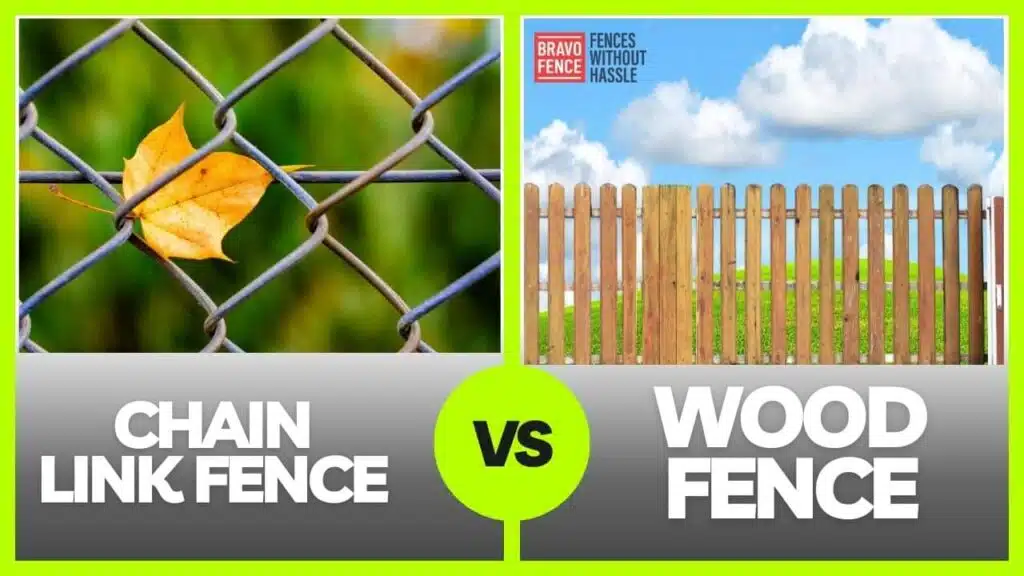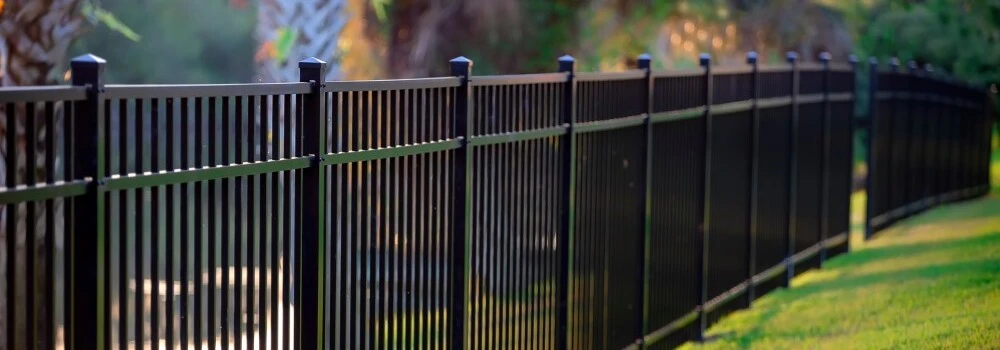
Chain Link Vs. Wood: Fence Style Pros and Cons
When it comes to choosing the perfect fence for your property, the decision often boils down to two primary options: chain link and wood.
Each style offers distinct advantages and disadvantages, making the choice a matter of personal preference, budget constraints, and the specific needs of your property.
In this article, we’ll discuss the pros and cons of chain-link and wood fences to help you make an informed decision.
Chain Link Fences: Pros and Cons
Chain link fences are a popular choice for their affordability, durability, and low maintenance requirements.
Here’s a closer look at the advantages and disadvantages of chain link fencing:
Pros:
Affordability: One of the most significant advantages of chain link fences is their affordability.
Chain link fencing is typically much cheaper to install than other fencing materials, such as wood or vinyl.
This makes it an attractive option for homeowners on a tight budget or those looking to fence large areas of land without spending a fortune.
Durability: Chain link fences are incredibly durable and can withstand harsh weather conditions, including heavy rain, snow, and high winds.
The galvanized steel construction ensures that the fence is resistant to rust and corrosion, prolonging its lifespan and reducing the need for frequent repairs or replacements.
Low Maintenance: Unlike wood fences that require regular staining, painting, or sealing to maintain their appearance and integrity, chain link fences are virtually maintenance-free. Occasional cleaning with soap and water is usually sufficient to keep the wall looking clean and presentable, saving you time and effort in the long run.
Transparency: Chain link fences offer excellent visibility, allowing you to maintain a clear view of your property while still providing security and containment.
This transparency is especially beneficial for homeowners who want to watch children or pets playing in the yard without compromising safety.
Cons:
Limited Aesthetic Appeal: While chain link fences excel in affordability and durability, they often need more aesthetic appeal than other fencing materials.
The practical design may not complement the architectural style of certain homes or neighborhoods, leading some homeowners to opt for more visually appealing alternatives.
Lack of Privacy: One of the most significant drawbacks of chain link fences is their inability to provide privacy.
The open design allows passersby to see into your yard, which can be a concern for homeowners who value their privacy.
While privacy slats or screening materials can be added to enhance privacy, they may incur additional costs and detract from the fence’s minimalist aesthetic.
Limited Security: While chain link fences are effective at containing pets and deterring trespassers, they may provide a different level of security than solid barriers like wood or vinyl fences.
The gaps between the chain link mesh make it easier for intruders to climb or access your property, potentially compromising security.
Wood Fences: Pros and Cons
Wood fences have long been a popular choice for their timeless aesthetic appeal, versatility, and privacy. Let’s explore the advantages and disadvantages of wood fencing:
Pros:
Aesthetic Appeal: Wood fences are renowned for their natural beauty and timeless appeal.
Whether you prefer the rustic charm of cedar or the classic elegance of redwood, wood fencing offers a wide range of options to suit your style and complement your home’s architecture.
With proper maintenance, a well-built wood fence can enhance the curb appeal of your property and increase its value.
Versatility: Wood fences are incredibly versatile and can be customized to meet your specific needs and preferences.
From traditional picket fences to modern horizontal designs, the design possibilities are virtually endless.
Additionally, wood can be stained or painted in a variety of colors to match your exterior décor or create a striking contrast.
Privacy: One of the primary reasons homeowners choose wood fences is for the privacy they provide.
Solid wood panels effectively block sightlines and create a sense of seclusion, allowing you to enjoy your outdoor space without prying eyes.
This makes wood fencing ideal for properties where privacy is a top priority, such as backyard patios or pool areas.
Security: Wood fences offer enhanced security compared to chain link or wire mesh fences. The solid construction and lack of gaps make it more difficult for intruders to climb or breach the barrier, providing peace of mind for homeowners concerned about security.
Cons
Higher Cost: One of the main drawbacks of wood fences is their higher upfront cost compared to chain link or wire fencing.
The price of wood fencing can vary depending on the type of wood, style, and size of the fence, making it a significant investment for some homeowners.
Additionally, ongoing maintenance costs, such as staining or sealing, should be factored into the overall expense.
Maintenance Requirements: Unlike chain link fences that require minimal maintenance, wood fences need regular upkeep to preserve their appearance and structural integrity. This may include staining or sealing the wood every few years to protect it from moisture, rot, and insect damage.
Failure to maintain the fence properly can lead to premature deterioration and costly repairs.
Susceptibility to Rot and Decay: Wood fences are susceptible to rot, decay, and insect infestations, especially if they are not properly maintained or installed in areas with high moisture levels.
Over time, exposure to the elements can cause the wood to warp, split, or deteriorate, compromising the fence’s stability and aesthetics.
Limited Lifespan: Despite proper maintenance, wood fences have a limited lifespan compared to other fencing materials.
Depending on the wood and environmental factors, a wood fence may last anywhere from 10 to 20 years before needing replacement.
This shorter lifespan may deter some homeowners who are looking for a long-term fencing solution.
Conclusion
In conclusion, both chain links and wood fences offer distinct advantages and disadvantages, making them suitable for different applications and preferences.
Chain link fences are prized for their affordability, durability, and low maintenance requirements, while wood fences are celebrated for their aesthetic appeal, privacy, and security.
Ultimately, the decision between chain link and wood fencing depends on factors such as budget, desired aesthetics, maintenance preferences, and the specific needs of your property.
By weighing the pros and cons of each fence style and considering your priorities, you can make an informed decision that enhances the beauty, security, and functionality of your outdoor space.
FAQs
Which fence type is more affordable: chain link or wood?
Chain link fences are generally more affordable upfront compared to wood fences. However, factors such as the size of the wall and the quality of materials can influence the overall cost.
Do chain link fences offer any privacy?
Due to their open design, chain link fences do not provide much privacy. However, privacy slats or screening materials can be added to enhance privacy, albeit at an additional cost.
Are wood fences more secure than chain link fences?
Yes, wood fences typically offer better security than chain link fences. The solid construction of wood panels makes it harder for intruders to breach the barrier compared to the gaps in chain link mesh.
Which fence type requires less maintenance?
Chain link fences are generally low maintenance, requiring occasional cleaning with soap and water. Wood fences, on the other hand, need regular staining or sealing to protect against moisture, rot, and insect damage.
How long do chain links and wood fences typically last?
Chain link fences are durable and can last for decades with minimal maintenance. Wood fences have a shorter lifespan, typically lasting between 10 to 20 years, depending on the type of wood and maintenance practices.
Can wood fences be customized to match my property’s style?
Yes, wood fences are highly customizable and offer various design options to complement your property’s architecture and personal style. They can be stained or painted to achieve the desired aesthetic.
Are chain link fences suitable for containing pets?
Yes, chain link fences are effective at containing pets due to their sturdy construction. However, small pets may be able to squeeze through the gaps in the mesh so that additional precautions may be necessary.
Do wood fences require professional installation?
While DIY installation is possible for wood fences, professional installation is often recommended to ensure proper alignment, stability, and longevity of the wall.
Can I install a wood fence in areas with high moisture levels?
Yes, wood fences can be installed in areas with high moisture levels, but proper maintenance is crucial to prevent rot and decay. Choosing a rot-resistant wood species and applying a protective sealant can help mitigate moisture damage.
Which fence type adds more value to my property?
Both chain link and wood fences can add value to your property. Still, the impact may vary depending on factors such as location, neighborhood preferences, and the overall condition of the wall. In specific contexts, a well-maintained wood fence may contribute more to curb appeal and property value.
Tags: Explore Helpful Resources on Chain Link Vs Wood Fences Cost, Explore Helpful Resources on Chain Link Vs Wood Fences Pros And Cons, Inspiration and Tips on Pros And Cons Of Chain Link Fencing, Top Ideas and Insights About Chain Link Fence Installation, Top Ideas and Insights About Chain Link Vs Wood Fences

